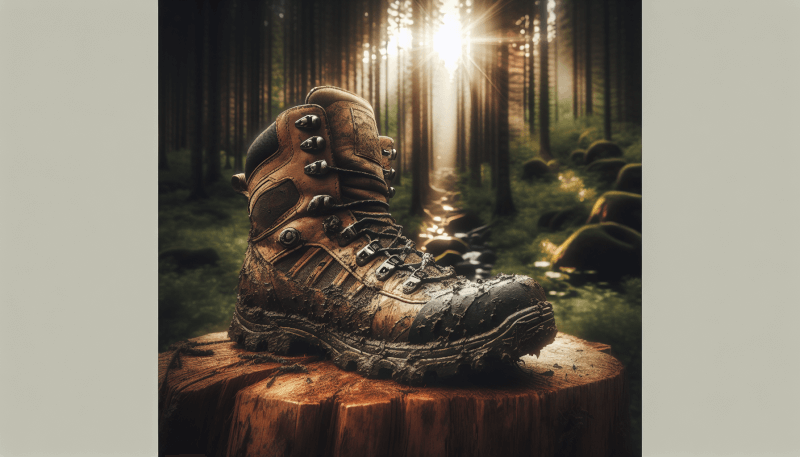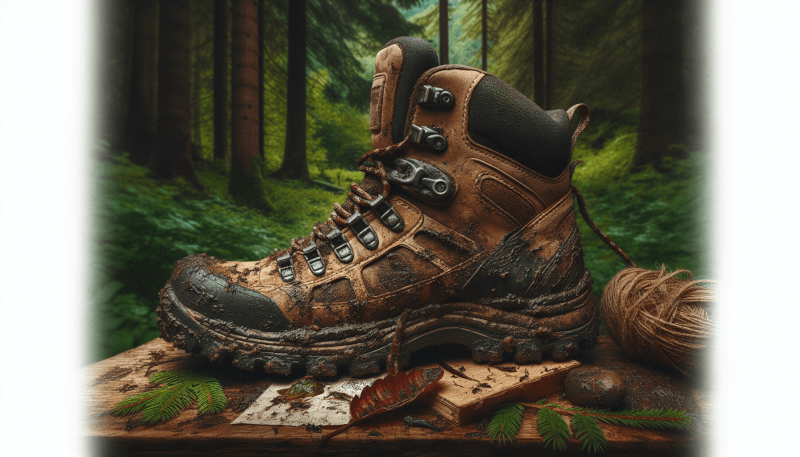Imagine being surrounded by towering trees, breathing in the crisp, fresh air, and feeling the warmth of a crackling campfire. In the captivating world of camping adventures, challenges lurk around every corner, eagerly waiting for you to overcome them. From conquering treacherous hiking trails to braving unexpected weather conditions, these tales of triumph in the wilderness will leave you inspired to embark on your own thrilling escapades. Join us as we uncover the untamed beauty of nature and the indomitable spirit of those who choose to embrace it. Get ready to be captivated by the exhilarating stories of overcoming challenges in the wild and let your imagination run wild.
The Thrill of the Wilderness
Camping in the wilderness is a thrilling and exhilarating experience that allows you to escape the hustle and bustle of city life. It’s a chance to connect with nature, breathe in the fresh air, and immerse yourself in the beauty of the great outdoors. Whether you’re a seasoned camper or a beginner, there’s always something exciting about venturing into the unknown and embracing the challenges that come along the way.
Building Unforgettable Memories
One of the most rewarding aspects of camping in the wilderness is the opportunity to build unforgettable memories. Every camping adventure is unique and provides a chance to create lasting experiences that you can cherish for a lifetime. From sitting around the campfire roasting marshmallows and swapping stories with friends and family to embarking on thrilling hikes and spotting wildlife, these moments will stay with you forever. Camping allows you to disconnect from the digital world and reconnect with the people and places that truly matter.

Navigating Unknown Terrain
Preparing with Maps and GPS
When camping in unfamiliar terrain, it’s crucial to come prepared with maps and GPS devices. These tools will help you navigate through the wilderness and find your way back to camp. Familiarize yourself with the topography of the area and mark important landmarks on your map. GPS devices can provide precise coordinates and give you a sense of direction even in the most challenging environments.
Learning to Read Trail Markers
Trail markers are essential for staying on the right path during your camping adventure. These markers, such as brightly colored signs or ribbons, guide you along the designated trails and prevent you from getting lost. Take the time to familiarize yourself with trail markers before embarking on your journey, and always keep an eye out for them to ensure you stay on track.
Using Compass and Orienteering Skills
No camping adventure is complete without the use of a compass and basic orienteering skills. These tools are essential for navigating through the wilderness, especially in areas where GPS devices may not be reliable. Learn how to read a compass and understand the different directions and bearings. Practice your orienteering skills in advance, so you can confidently navigate through the unknown terrain.
Dealing with Unpredictable Weather
Preparing for Extreme Temperatures
Weather conditions can change rapidly in the wilderness, so it’s important to be prepared for extreme temperatures. Pack appropriate clothing layers that can be adjusted based on the temperature fluctuations. Make sure to bring extra warm clothing, such as hats and gloves, for chilly nights. Additionally, be prepared for scorching hot days by packing lightweight and breathable clothing that offers sun protection.
Surviving Storms and Thunderstorms
Mother Nature is unpredictable, and camping in the wilderness means you’re susceptible to storms and thunderstorms. Stay safe by monitoring weather forecasts before your trip and being aware of any approaching storms. If a storm does hit, seek shelter in a sturdy tent or find a natural sheltered area away from tall trees. Avoid open spaces, high ground, and bodies of water during thunderstorms.
Managing Rain and Wet Conditions
Rain can quickly turn a camping trip into a muddy and wet affair. Embrace the challenge and come prepared with waterproof gear, including rain jackets, pants, and waterproof hiking boots. Set up your tent in an elevated area to prevent water from seeping inside. Create a waterproof barrier around your campsite by digging trenches to divert water away. And most importantly, maintain a positive attitude and have fun splashing in the puddles!

Confronting Wildlife Encounters
Identifying and Avoiding Dangerous Animals
Encounters with wildlife are an exciting part of camping in the wilderness; however, it’s important to identify and avoid dangerous animals. Research the local wildlife species in the area you’ll be camping in and learn about their behavior and habitats. Avoid leaving food or garbage out in the open, as it may attract wildlife. Keep a safe distance from any wild animals you encounter and never attempt to feed or touch them.
Handling Close Encounters with Wildlife
Despite precautions, you may still come across wildlife during your camping adventure. If you encounter an animal at a close distance, remain calm and slowly back away without turning your back. Speak in a calm voice and give the animal ample space to move away. Maintain eye contact but avoid direct confrontation. Remember, it’s their home, and respecting their space is essential for both your safety and theirs.
Protecting Campsites from Intruding Animals
To prevent wildlife from intruding upon your campsite, it’s important to take certain precautions. Store all food, garbage, and scented items in airtight containers and keep them in a locked vehicle or suspended from a tree branch away from your sleeping area. Avoid cooking and eating near your sleeping area, as the smell of food can attract animals. Respect the environment and dispose of waste properly to minimize the risk of wildlife encounters.
Managing Limited Resources
Planning and Packing Essential Supplies
When camping in the wilderness, resources such as food, water, and fuel may be limited. Plan your meals in advance and pack non-perishable food items that are lightweight and easy to prepare. Bring a sufficient supply of water or research nearby water sources along your route and pack a water purification system. Additionally, consider the fuel needed for cooking and ensure you have an adequate supply.
Finding and Filtering Water Sources
In the wilderness, finding a safe and reliable water source is crucial. Research and map out potential water sources before your trip, such as rivers, streams, or lakes. Invest in a quality water filtration system or purification tablets to ensure the water you consume is free from harmful bacteria or parasites. Remember to always follow Leave No Trace principles and avoid contaminating water sources.
Cooking and Maximizing Meals
When resources are limited, it’s important to make the most out of your meals. Opt for lightweight camping cookware that is easy to carry and clean. Consider meals that can be prepared using minimal ingredients or that allow for creative substitutions. Plan meals that provide sufficient nutrients and energy to keep you fueled throughout your camping adventure. And don’t forget to pack some tasty snacks to enjoy on the trails!

Overcoming Physical and Mental Exhaustion
Building Endurance and Strength
Camping in the wilderness often involves physically demanding activities, such as hiking or carrying heavy backpacks. Prepare your body by building endurance and strength before your trip. Engage in regular physical exercise and focus on activities that mimic the movements and demands of camping. Incorporate cardio exercises to improve stamina and strength training to build muscle and prepare for carrying heavy loads.
Coping with Fatigue and Soreness
It’s natural to experience fatigue and soreness during a camping adventure. Listen to your body and take breaks when needed. Stretch before and after physical activities to prevent muscle stiffness and reduce the risk of injury. Use over-the-counter pain relievers or topical creams to alleviate muscle soreness. Ensure you get enough restful sleep at night to allow your body to recover and recharge.
Maintaining Mental Resilience
Camping in the wilderness can be mentally challenging, especially when faced with unexpected obstacles. To maintain mental resilience, practice mindfulness and positive thinking. Appreciate the beauty of nature surrounding you and stay present in the moment. Embrace the challenges as opportunities for personal growth and learning. Surround yourself with supportive and like-minded individuals who can provide encouragement and motivation.
Solving Camping Equipment Failures
Fixing Tent and Sleeping Gear Issues
Camping equipment failures can happen, but it’s important to be prepared to solve them. Before your trip, familiarize yourself with your tent and sleeping gear and practice setting them up. Bring a repair kit that includes spare tent poles, patch kits, and extra stakes. If any issues arise, assess the problem calmly and use your repair kit to fix it. Always double-check your equipment before heading out on your camping adventure.
Repairing Stoves and Cooking Equipment
Cooking equipment is essential for preparing meals while camping, and equipment failure can be a real setback. Pack a compact repair kit specifically for your cooking equipment, including extra fuel canisters, stove parts, and repair tools. If you encounter any issues, refer to your equipment’s user manual or online resources for troubleshooting steps. With a little ingenuity and resourcefulness, you’ll be back to cooking in no time.
Overcoming Navigation Device Problems
When relying on navigation devices in the wilderness, it’s important to be prepared for any potential problems that may arise. Keep your navigation devices charged and bring extra batteries or a portable charger. Familiarize yourself with the functions and operation of your devices before your trip. If technical issues occur, refer to the user manual or seek assistance from fellow campers who may have experienced similar problems.

Surviving Unexpected Emergencies
Administering Basic First Aid
In the event of an accident or injury during your camping adventure, knowing basic first aid skills can make a significant difference. Familiarize yourself with common injuries and learn how to clean and dress wounds, treat burns, and immobilize fractures. Pack a comprehensive first aid kit that includes bandages, antiseptic ointment, pain relievers, and any prescription medications you may need. Take a first aid course beforehand to brush up on your skills.
Handling Injuries and Accidents
Despite taking precautions, accidents can still happen while camping. Remain calm and assess the situation before taking action. If someone is seriously injured, apply first aid and seek medical help immediately. Document any injuries and gather important information to assist medical professionals if necessary. If accidents involve minor injuries, provide appropriate first aid and ensure the person feels comfortable and safe.
Rescuing and Calling for Help
In more severe emergencies, it may be necessary to call for help or initiate a rescue operation. Familiarize yourself with the emergency procedures and contact numbers for the area you’ll be camping in. Carry a backup communication device such as a satellite phone or a Personal Locator Beacon (PLB) in case of limited cell service. Stay calm and provide rescuers or emergency services with accurate information about the situation and your location.
Embracing the Rewards
Celebrating Successful Campouts
When you successfully overcome challenges in the wilderness, it’s important to celebrate your accomplishments. Take the time to reflect on the obstacles you faced, the lessons you learned, and the memories you created. Share stories and photos with friends and family, and commemorate your camping adventure with a special memento or keepsake. Celebrate the fact that you pushed your boundaries and embraced the thrill of the wilderness.
The Joys of Being Connected with Nature
Camping in the wilderness allows you to disconnect from the chaos of everyday life and reconnect with nature. Take the opportunity to observe the beauty of the natural world around you – the towering trees, the sparkling rivers, the breathtaking sunsets. Immerse yourself in the sounds and smells of the wilderness and appreciate the serenity it brings. Explore hiking trails, watch birds soar overhead, and bask in the peace that can only be found in nature.
Creating Lifelong Bonds with Fellow Campers
Camping in the wilderness is not only a chance to connect with nature, but also an opportunity to build bonds with fellow campers. Share stories, laughter, and delicious meals around the campfire. Help each other overcome challenges and support one another through the ups and downs of camping. The friendships forged during camping adventures have a unique depth and can last a lifetime. Embrace the camaraderie and cherish the connections you make.
Camping adventure stories are filled with overcoming challenges, embracing the rewards, and building unforgettable memories. By navigating unknown terrain, dealing with unpredictable weather, confronting wildlife encounters, managing limited resources, and overcoming physical and mental exhaustion, you’ll embark on a journey of resilience and self-discovery. So grab your camping gear, prepare for the unexpected, and immerse yourself in the thrill of the wilderness. The great outdoors is waiting for you – ready to inspire, challenge, and reward you in ways you never thought possible. Happy camping!



